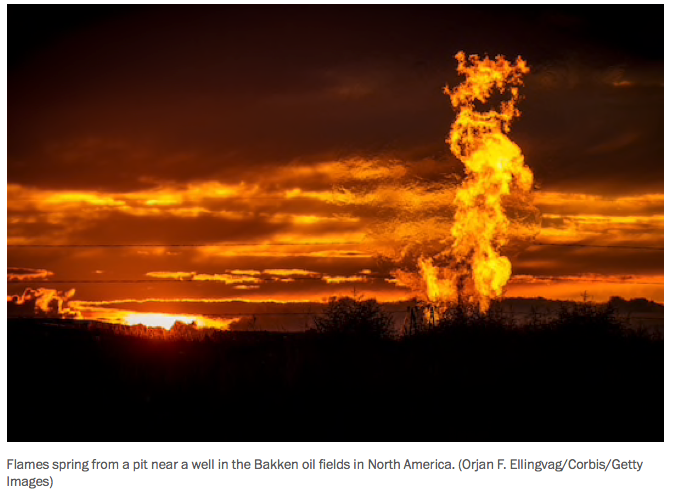The Global Methane Pledge aims to cut emissions of the potent greenhouse gas by at least 30 percent by the end of the decade
By Brady Dennis
Reporter focusing on environmental policy and public health issues EmailBioFollow, Michael Birnbaum and Steven Mufson September 14, 2021 at 9:00 p.m. EDT
The United States and Europe will launch an international push to reduce global methane emissions by nearly a third by 2030, as part of a broader effort to more aggressively combat climate change, according to people familiar with the plan and a planning document provided to The Washington Post.
U.S. and European Union officials plan to ask other key nations to sign on to the Global Methane Pledge as soon as this Friday, when President Biden and leaders of major economies gather for a virtual, closed-door meeting on climate and energy issues.
Leaders are expected to officially launch the effort at a high-profile United Nations climate summit this fall in Glasgow, Scotland. The White House did not immediately respond to a request for comment on Tuesday. A spokesman for the European Commission declined to comment.
A European official familiar with the discussions said that the E.U. and the United States recently reached the deal to reduce methane emissions by 30 percent below 2020 levels by the end of the decade. The official, who spoke on the condition of anonymity to discuss closed-door diplomatic talks, said the two sides are focused on convincing other countries to join the effort.
The agreement was first reported by Reuters.
Swift action to cut methane emissions could slow Earth’s warming by 30 percent, study finds
Methane, the world’s second-most prevalent greenhouse gas, comes from an array of sources, including fossil-fuel extraction, landfills, livestock and other agricultural waste. It vanishes relatively quickly from the atmosphere, but in the short term, it is about 85 times more potent than carbon dioxide in warming the planet.
As atmospheric concentrations of methane have continued to soar in recent years, international climate negotiators and scientists alike have focused more than ever on finding ways to rein in the powerful gas.
Researchers have calculated that a full-scale push to cut methane emissions could slow the rate of the Earth’s warming as much as 30 percent. A study published this spring in the journal Environmental Research Letters found that concerted efforts to curb methane could significantly help the world meet the central aim of the Paris climate accord — limiting warming to “well below” 2 degrees Celsius (3.6 degrees Fahrenheit) compared with preindustrial levels.
The world already has warmed more than 1 degree Celsius (1.8 Fahrenheit), with few signs of slowing. And scientists have made clear that such warming will continue — and the calamities caused by climate change will only grow worse — without rapid and large-scale reductions in greenhouse gas emissions.
In short, scientists say, methane is the low-hanging fruit of climate action. Cutting emissions of it quickly and dramatically, they argue, is the strongest lever humans have to avoid some of the deepening catastrophes of climate change in coming years.
Humans have pushed the climate into ‘unprecedented’ territory, landmark U.N. report finds
Climate activists welcomed the push for a coordinated, global commitment focused on methane.
“We commend the countries that take this pledge and urge them to move from verbal ambition to decisive action,” Sarah Smith, director of the Super Pollutants Program at the Clean Air Task Force, said in a statement. “The science tells us we have vanishingly little time left to slow global warming before we start passing serious climate tipping points. The fastest way to pump the brakes is to reduce methane pollution.”
The undertaking could serve as a way for nations to showcase their national commitments to cut methane, “something we have sorely needed as climate change takes hold around the world,” she said. “This will be a promising first step. … We now need all world leaders to step up and act.”
In the United States, the push to limit methane emissions has found a measure of bipartisan support. This summer, a bipartisan group of lawmakers voted to restore a rule targeting leaks of methane from oil and gas operations — the nation’s largest industrial source of such emissions — reinstating Obama-era standards that had been dismantled under President Donald Trump.
The Biden administration, meanwhile, has pledged to cut the nation’s overall emissions by at least half by 2030, in part by pursuing even tougher standards on methane pollution. The Environmental Protection Agency is expected to detail a more stringent set of proposals for overseeing methane later this month, and congressional Democrats are considering imposing a fee on methane emissions as part of a broad $3.5 trillion budget bill they aim to pass this fall.
Ali Zaidi, the president’s deputy national climate adviser, described curbing methane emissions in an interview with The Post this week as “one of the most important things we can be doing, especially in terms of the near-term picture, when it comes to climate.”
To read the Article in The Washington Post click here.

